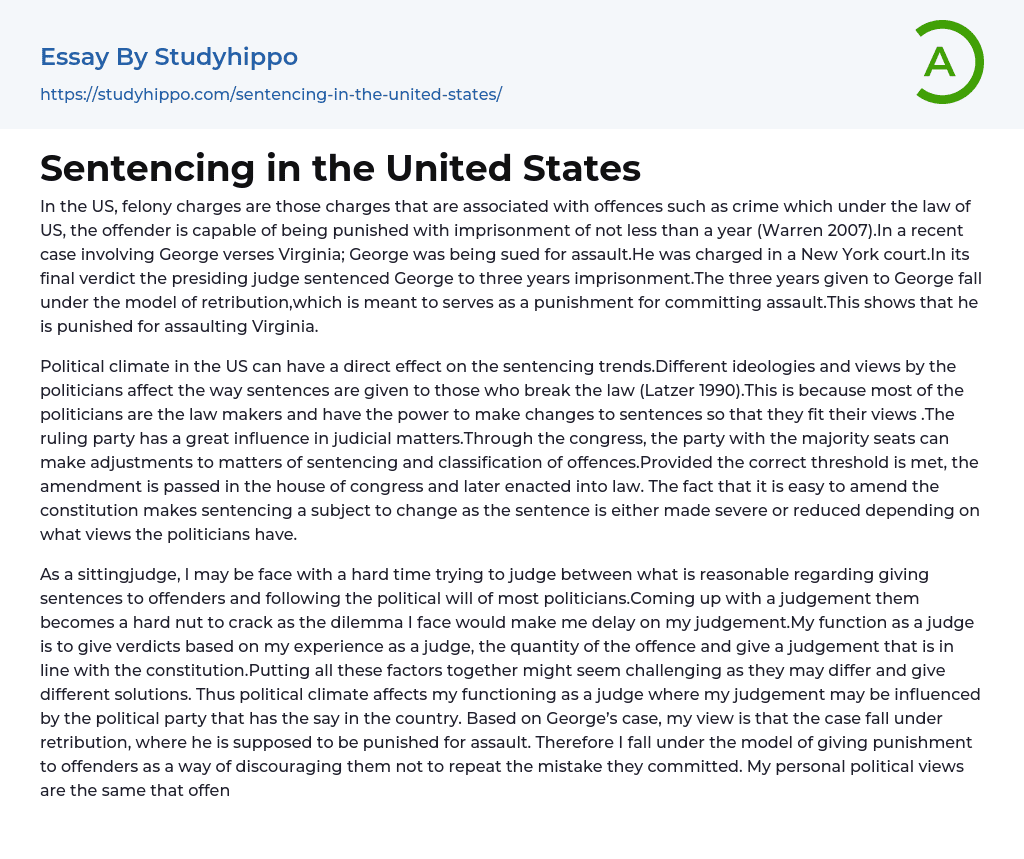In the United States, felony charges refer to offenses that are punishable by imprisonment of at least one year according to the country's legal system (Warren 2007). A recent case involving George against Virginia occurred, where George was sued for assault and faced charges in a New York court. The presiding judge sentenced George to three years in prison as a form of retribution, serving as a punishment for his assault on Virginia.
The political climate in the US has a direct impact on sentencing trends because politicians, who are also the law makers, have the power to adjust sentences according to their ideologies and viewpoints (Latzer 1990). The ruling party holds significant influence over judicial matters. By utilizing their majority in Congress, they can modify sentencing guidelines and classify offenses. Once the necessary threshold is
...met, these amendments are passed in the House of Congress and enacted into law. The ease of amending the constitution means that sentencing is subject to change, becoming either more stringent or lenient based on politicians' perspectives. As a sitting judge, I often face the challenge of balancing what is reasonable in terms of sentencing offenders with the political will of many politicians. This dilemma makes it difficult for me to swiftly deliver judgments, as I must navigate between my experience as a judge, the severity of the offense, and ensuring alignment with the constitution. Combining all these factors can be challenging as they may lead to contrasting conclusions.The political climate has an impact on my role as a judge, as my decision-making can be swayed by the prevailing political party in power. Regarding George's case, I believe it fall
within the category of retribution, where he should be punished for his assault. Consequently, I align with the model of administering punishments to offenders as a deterrent against future wrongdoing.
My personal political views are that offenders should be held accountable for their crimes through punishment.
References
- Latzer, B. (1990). New Judicial Federalism and Criminal Justice: Two Problems and a Response, The. Rutgers Lj, 22, 863.
- Warren, R. K. (2007). Evidence-Based Practices and State Sentencing Policy: Ten Policy Initiatives to Reduce Recidivism. Ind. LJ, 82, 1307. /docProps/thumbnail.wmf
- Absolutism essays
- Appeal essays
- Bourgeoisie essays
- Contras essays
- Corporate Governance essays
- Corruption essays
- Democracy essays
- Democratic Party essays
- Developed Country essays
- Dictatorship essays
- Elections essays
- European Union essays
- Federalism essays
- Foreign essays
- Foreign policy essays
- Gentrification essays
- Hillary Clinton essays
- Income Tax essays
- International Relations essays
- John Marshall essays
- John Stuart Mill essays
- Left-Wing Politics essays
- Liberty essays
- Military essays
- Monarch essays
- Monarchy essays
- Political Corruption essays
- Political Party essays
- Political Science essays
- President Of The United States essays
- Public Service essays
- Red Cross essays
- Reform essays
- Republic essays
- Revenge essays
- Social Security essays
- Sovereign State essays
- State essays
- Supply essays
- Terrorism essays
- United Nations essays
- World Trade Organization essays




